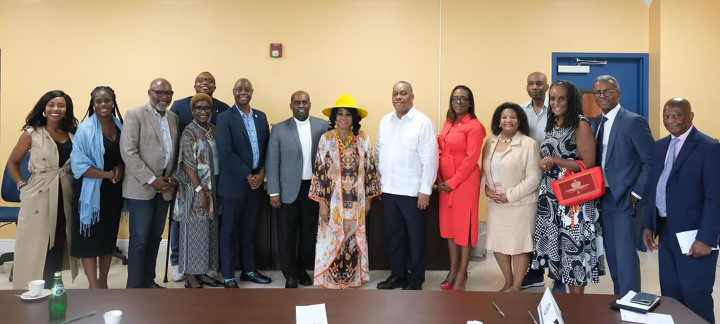By Tom Tracy - Florida Catholic

Photographer: COURTESY
Haitian new Prime Minister Garry Conille (white shirt in center) met with Father Reginald Jean-Mary, pastor of Notre Dame D'Haiti Mission in Miami, and Haitian American leaders June 29,2024, at the Mission in Miami's Little Haiti neighborhood.
MIAMI | Pastor of Notre Dame D'Haiti Mission in Miami, said the recent announcement by the U.S. government to extend temporary legal status to hundreds of thousands of Haitians is welcomed news.
Father Reginald Jean-Mary said the Biden Administration’s June 28 announcement brings much needed relief for Haitian migrants given the turmoil in Haiti.
The decision reportedly allows some 300,000 Haitians already in the U.S. to be eligible for temporary legal status, enabling them to remain and work in the U.S. in light of the dangerous gang-driven violence in the Caribbean nation.
The TPS designation will prevents deportations to countries suffering from natural disasters or civil strife. The Secretary of Homeland Security can grant temporary protection for different nationalities based on conditions in their home countries. It’s generally for a designated period, and people must apply for protection and demonstrate that they qualify for it, noted the Associated Press.
“We did call for this, and we are very grateful to the Biden administration and all the people who have advocated to make it happen,” Father Jean-Mary told the Florida Catholic, noting that the new provision not only offers protections for Haitians who have been in the country for several years, but those who arrived as recently as June 3 of this year.
“The only challenge is that many of those people have not been working and have to pay for TPS at a time when their families have been saturated (with financial hardships),” the priest said, adding that the TPS related fees can typically range from donations to $500 to $800. He would like to see those fees waived.
“We were flooded with people — especially after this (TPS) announcement; people who come with questions about TPS, work permits, humanitarian assistance and political asylum,” said Father Jean-Mary.
Notre Dame D’Haiti Mission has seen many waves of newly arrived Haitian immigrants pass through the church community, including those who participate in adult education classes and are served by the immigration processing assistance program of Catholic Legal Services of the Archdiocese of Miami.
On June 29, the mission hosted the first official visit to the United States by Haiti's new interim Prime Minister Garry Conille, who brought together elected and local community leaders, including Father Jean-Mary.
Prime Minister Conille takes the reins of Haiti after gangs, which control 80% of the capital Port-au-Prince, forced former Prime Minister Ariel Henry to resign last April. Conille's mission is to stabilize the country until elections for a new president can be held. Haiti is living through a period of chaos accentuated by the assassination in 2021 of then-President Jovenel Moise.
“With the humanitarian crisis we have lost at least 30 % of the workforce in Haiti. They are mostly young people who arrived with the energy and thirst to accomplish something here and who can benefit both Haiti and this country through a willingness to work,” said Father Jean-Mary.
The priest is concerned that with so many young people leaving Haiti, emigration will further erode the quality of life and the economy in his home country.
Meanwhile, a special international peacekeeping task force of several hundred police, mostly Kenyan, arrived in Haiti this spring through a United Nations initiative in an attempt to restore law and order in the country after four years of gang-related violence and criminal mayhem.
Gang activity, especially in the Haitian capital, has included kidnappings and extortion of civilians and clergy staff and missionaries.
The result has been largescale internal migration among Haitians, along with those who have sought to go abroad, seeking entry into the U.S. and other countries.
Father Jean-Mary said he is generally supportive of the international peacekeeping force, which he said will soon include nationals from other Caribbean nations, but time is running out against the deteriorating situation there.
The total commitment of U.S. peacekeepers should peak at about 1,000 troops, while only 400 have made their way to Haiti as of June.
“It is very dangerous work, as the gangs are powerful, organized, and well-armed with weapons of war,” the priest said.
“And we know it could be dangerous in terms of civilian casualties: the gangs are composed of some 60 percent minors. The gang leaders put minors at the forefront as shields because they know that would be a scandal to shoot at them.”
“We need to see some action because it has been four years of this insecurity and nothing is possible in Haiti at this time,” he added.
In the meantime, Notre Dame D’Haiti Mission continues to serve as a hub for the Haitian diaspora through computer and language literacy programs for adults and youth.

